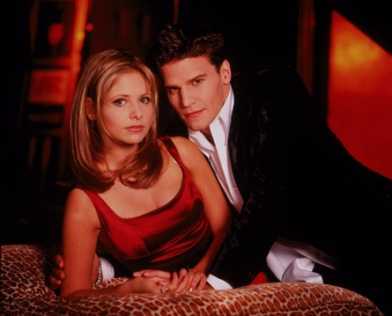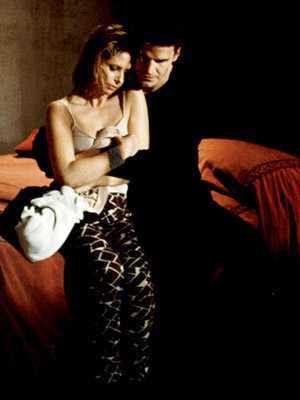

 |
This encounter between the two characters is highly sexualized. For Buffy, it's morning, and for Angel, it's bedtime (he is, after all, a vampire). We are seeing much of the male gaze here, a term developed by Mulvey that can essentially describe the way males view women - as objectified objects who are visually pleasing (Rose, 121). We see many cuts and eye-line matches from Angel to Buffy, who is conventionally attractive and also ready for the day (in other words, a full face of make up, perfectly groomed hair, a nice outfit, etc). This also leads to fetishistic scopophilia, another term coined by Mulvey. It is "when the female figure is represented simply as a beautiful object of display" -- "her beauty is so overwhelming, often pictured in huge close-ups, so perfect, that the threat of castration is assuaged as she is turned into a reassuring object in an intimate relation to the spectator" (Rose, 118). And, indeed, this scene is almost shot entirely using close-ups. We are certainly seeing Buffy as merely a beautiful object, and not the empowered female who continually saves the world. |
| Before I discuss the scene in which Buffy and Angel have sex, it is first important to note the scene right before this in which Angel gives Buffy a ring for her birthday. Not only does this ring once again establish the masculine/feminine roles between the two characters (the one who should be receiving jewelry is the female; the one who should be giving it is the male), but it also shows that Buffy now "belongs" to him - similar to the idea of marriage, which the ring very well may represent. Angel tells Buffy that the ring is a sign of devotion and to "wear it with the heart pointing towards you" as it means that she "belongs to somebody." This ring also becomes important because, as I have stated, it potentially represents marriage - which is even further proved in the very next scene, where Buffy agrees to have sex with Angel (if he has "claimed" her through giving her the ring, there is nothing wrong with consenting to sex). |  |
 |
We eventually learn that this sexual encounter has caused Angel to lose his soul - returning him back to a "normal" and evil vampire, who is now called Angelus. Not only did Buffy allow a man to dominate her, but she is also the cause of him becoming evil. Because of this, Buffy has become "the Eve-like temptress an seducer who precipitates [Angel's] fall into hell - in fact she literally sends him there" (Magoulick, 9). We greatly see a transformation in Angel, especially regarding his gaze towards Buffy. Where once we were subjected to his "male gaze," we now see voyeurism being used - which is "a way of seeing that is active; it distances and objectifies what is looked at. It is controlling and even sadistic, says Mulvey. It is a look that is only given to men by films (whether as characters in the film or as the film's audience). It deals with castration anxiety by investigating the woman and then punishing or saving her" (Rose, 117). While perhaps Mulvey didn't mean that voyeurism was "controlling and sadistic" in a literal sense, it certainly becomes literal when it involves Angelus. |